Message from
Commissioner Dykes
I am honored to serve as the new Commissioner for DEEP. Good communication is important to me, as such I will continue to use this as a forum to share news and updates of interest.
I may be biased, but I can't think of an agency that has a more vital purpose. The work we do at DEEP protects our air, water, land, flora and fauna, and powers our state with clean, reliable, and affordable energy. Our work keeps Connecticut families safe and healthy, provides outstanding outdoor recreational opportunities, and ensures a thriving economy for Connecticut businesses.
Over the coming weeks and months, I will be traveling throughout the state to hear from towns, businesses and other stakeholders groups about what DEEP is doing right and what we can do better. In the meantime, if you have questions or concerns please reach out, my door is open.
I also want to share that we have some new faces at DEEP. Vicki Hackett has been brought on as Chief of Staff, Operations, and Performance. Vicki is a talented lawyer and public servant, who spent eleven years at the Office of Consumer Counsel before working with me at PURA as the Director of Adjudications. James Albis has joined as Senior Advisor to the Commissioner. James previously served as the state representative for East Haven, including a distinguished tenure as House Chairman of the Environment Committee. Finally, Mandi Careathers is our new Legislative Liaison. Mandi previously served as Governor Malloy's Senior Legislative Affairs Director, and is a veteran of numerous state and national campaigns.
I want to close by saying that I had the privilege to work closely with Rob Klee for almost seven years. He has been an incredible colleague and friend to us all, and I cannot thank Commissioner Klee enough for his tremendous service to DEEP.
|
|
|
|
Statewide Tree Damage
Warning Sign
|
|
|
Major Climate Reports Have Implications for New England
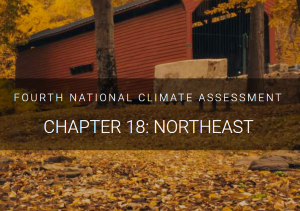
Two recent major reports highlight the extent to which New England is vulnerable to the impacts of global climate change.
The National Climate Assessment, published in November, includes a focus on socioeconomic impacts in the Northeast. The warming ocean, sea level rise, and ocean acidification expected as climate change progresses threaten the region's commerce, tourism, and recreation. Meanwhile, "Major negative impacts on critical infrastructure, urban economies, and nationally significant historic sites are already occurring and will become more common with a changing climate." Projected health impacts include "additional deaths, emergency room visits and hospitalizations, and a lower quality of life."
The human and natural systems most impacted by this warming are tropical or arctic (e.g., warm-water corals), but impacts will be felt across the mid-latitudes as well. The report foresees "severe and widespread" effects through degradation to terrestrial ecosystems and increases in coastal flooding and river flooding. It also reports significant impacts on crop yields and tourism.
|
|
Online Tool Shows CT Communities at Risk as Sea Level Rises
FloodIQ.com provides graphic evidence of threats to Connecticut's shoreline communities as sea level rises. The searchable tool shows how communities large and small, from Mystic to
Greenwich, face greater risk of tidal flooding and storm surges over the next 15 years.
Using data from sources such as NOAA, USGS, and NWS, the public tool details overall impacts on property values, the number of individual residential and commercial properties at risk, and the number of community facilities (e.g., schools) at risk.
Communities identified as "at risk" include the shoreline municipalities of Bridgeport, East Haven, Groton, Guilford, Mystic, New Haven, New London, Southport (Fairfield), Stamford, Greenwich, Stonington, West Haven, and Westport. Municipalities along tidal rivers, such as Shelton and North Haven, are also identified as "at risk".
Communities further upstream along tidal rivers, including Middletown and Hartford, are identified as having "minimal risk" but are warned that risk "will worsen as sea levels continue to rise" beyond the tool's 15-year time frame. No data are provided for some communities, such as Branford and Milford.
FloodIQ was developed by First Street Foundation, a nonprofit that "quantifies and communicates the increasing risks associated with sea level rise."
|
|
DEEP Selects Zero-Carbon Energy Projects in CT, ME, and NH
The bulk of the power will be provided by the Millstone nuclear power station in Waterford under a 10-year contract that will help protect a zero-carbon energy facility the agency had concluded was at risk of premature closure. A smaller 8-year contract will also be developed with the Seabrook Station nuclear plant in New Hampshire.
A 20-year contract with Revolution Wind will boost the state's commitment to wind power development off the Rhode Island shore. Additional 20-year contracts will be developed for 9 solar power projects in Connecticut (Plainfield, East Windsor, and Montville), Maine, and New Hampshire.
This portfolio of zero-carbon resources aims to help Connecticut fulfill its obligation to reduce carbon emissions, while keeping the Millstone facility financially viable and promoting investments in grid-scale wind and solar generation to ultimately replace Millstone.
The procurement was authorized in Public Act 17-3 in June 2017.
|
Electric Vehicle News
Connecticut's Hydrogen and Electric Automobile Purchase Rebate (CHEAPR) offers incentives up to $5,000 for state residents who buy or lease new battery electric, plug-in electric or fuel cell vehicles and has recently been infused with an additional $2 million dollars from the United Illuminating and Avangrid merger. With more than 35 vehicle models eligible for the CHEAPR rebate and other EV incentives available through the
Connecticut Green Bank, it's a great time to incorporate clean vehicles into your fleet.
Towns looking for a fun and educational April Earth Day event should consider holding an EV outreach event in coordination with Plug-In America's National Drive Electric Earth Day campaign. By hosting an EV fair, ride and drive, and/or information session, you can help connect local plug-in drivers, clean car advocates and others interested in clean transportation alternatives work towards making your community a cleaner place to live and also earn points towards your municipality's 2019 Sustainable CT certification. DEEP offers a wealth of resources on our EVConnecticut website to help you plan an EV event.

|
|
2019 National Clean Diesel DERA Program
The U.S. EPA has
announced they are accepting applications for projects that achieve diesel emission reductions, particularly from fleets operating in poor air quality areas. Eligible applicants include municipalities, school districts, metropolitan planning organizations, cities, counties, and other entities that are looking to replace or retrofit older diesel vehicles with cleaner transportation technology. Applicants from New England (EPA, Region 1) can request up to $1 million funding; there is no minimum on proposal amounts requested.
The U.S. EPA standards for new diesel engines make them more than 90 percent cleaner than older models but many older diesel engines still in operation predate these standards. Older diesel engines emit higher levels of pollutants such as
particulate matter (PM)
and
nitrogen oxides
(NOx)
, which have been linked to serious health problems such as aggravated asthma and lung damage. To learn more about the National DERA program, applicant eligibility and to stay up-to-date with any changes to this grant solicitation, please visit the
U.S. EPA's Clean Diesel webpage
.
 |
Grants for Water Quality Improvement Projects
Approximately $1 million in funds from the U.S. EPA is available for communities, local conservation groups, and other organizations to improve water quality in lakes, rivers, and streams that are not meeting water quality standards.
The funding, administered by DEEP, comes from Section 319 of the Federal Clean Water Act, which is a federal program to control
nonpoint sources (NPS) of water pollution. Common NPS pollutants include: bacteria, nutrients, sediment, salt, petroleum products, heavy metals, pesticides, and debris. These pollutants are typically carried by stormwater runoff into streams, lakes, and estuaries from diffuse land use and other activities that are not regulated as point source discharges. Previous grants have supported projects for dam removals, conservation practices on farms, and treatments of polluted runoff.
Proposals may be submitted by any interested public or private organization and must be received by April 3, 2019.
Additional details and application information.
|
|
GPLPE and Title V Reporting Moves to ezFile Portal
Annual compliance reports required under the General Permit to Limit Potential to Emit (GPLPE) and Title V Permit programs are due by March 1, 2019. In an effort to increase efficiency, the
necessary compliance forms are available for submission electronically through
DEEP's EMIT system
and are mandatory for GPLPE compliance reporting and submission of Title V Emission Statements. Title V Annual Compliance Certifications and Semi-Annual Monitoring Reports are available for electronic submittal; however, electronic submittal of these reports for calendar year 2018 is not mandatory.
Please note, there are new EMIT sign-in procedures for this reporting period. EMIT is now accessed through the
DEEP ezFile Portal
and includes a user self-management interface that gives users the ability to create an ezFile account, find their account name, reset their password and change their challenge questions. For further information, contact
Jared Millay
in the Compliance Analysis and Coordination Unit or visit DEEP's
ezFile Help website
.
|
|
Brownfield Redevelopment Breathes New Life into Historic Windsor Locks Mill
Montgomery Mill in Windsor Locks manufactured yarn, tinsel, and electric wire from 1871 until it closed in 1989. Boston-based Beacon Communities, LLC acquired the vacant mill in December 2017. Beacon Communities has been cleaning up contaminated soil and hazardous building materials on the site and is redeveloping the mill into 160 rental apartments, including a mix of market rate and affordable units. The project is expected to be complete by early summer 2019.
Montgomery Mill
is walkable to downtown Windsor Locks and a planned train station that will provide commuter and regional service to Hartford, New Haven and other destinations. This development is an important impetus for further revitalization in downtown Windsor Locks. The project will also enhance parking and access for nearby
Windsor Locks Canal State Park Trail
.
Montgomery Mill is one of 53 contaminated properties being redeveloped under one of Connecticut's innovative
brownfields liability relief programs, including the Abandoned Brownfields Cleanup and Brownfields Remediation and Revitalization programs. These programs offer relief from certain types of environmental liability to new owners who agree to clean up on-site contamination and restore those properties to productive use.
For further information contact DEEP's Brownfields Coordinator, Mark Lewis.
|
RecycleCT Foundation Releases Annual Report
The RecycleCT Foundation, Inc.'s first annual report summarizes its efforts since 2015. RecycleCT, created in 2014 through Public Act 14-94, provides research and public information programs aimed at increasing the rate of recycling and reuse in the state. In addition, RecycleCT also provides grantmaking programs to support these goals.
Founding Council members interpreted Public Act 14-94, developed by-laws for the new organization, filed for non-profit status with the I.R.S., developed and implemented programs and determined how to distribute funds to energize and invigorate efforts to reduce, reuse, recycle and compost more materials found in Connecticut's waste stream.
Officers elected this past fall include Frank M. Antonacci of Murphy Road Recycling as Vice Chair and Brian Paganini of Quantum BioPower as Treasurer, and new board member Michael Ferro III of City Carting and Recycling.
In addition, the Northeast Recycling Council was recently awarded a contract from RecycleCT to provide administrative support.
The Annual Report 2015-2018 is posted on the RecycleCT website in addition to its expanding Board membership. For more information about RecycleCT, please contact Sherill Baldwin at 860-424-3440.
|
|
Electronic Waste Recycling
Since 2011, Connecticut's E-Waste Recycling Program has recycled over 122 million pounds of unwanted consumer electronics, saved municipalities over $5.5 million in avoided disposal costs, approved 165 collection locations statewide, and created 85 recycling jobs, including 72 in Connecticut. (2018 Report on CT's E-Waste Recycling Program)
Under state law, unwanted covered electronic devices, also known as electronic waste (e-waste), are banned from trash disposal. Municipalities are required to provide free, convenient and accessible drop-off locations for computers, monitors, printers, and televisions. Municipalities and/or their regional authorities have agreements with DEEP-approved electronics recyclers who safely manage the e-waste. Electronics manufacturers pay the collection and recycling costs, DEEP's administrative costs, and there is no charge to towns or residents.
For more information on Connecticut's e-waste collection and recycling program, visit www.ct.gov/deep/e-waste, or call DEEP's Compliance Assistance Hotline at 888-424-4193.
|
DEEP Issues Consent Order to Multi-Tenant Housing Owner For Recycling Violations
For several years DEEP has implemented a recycling enforcement initiative to address noncompliance with Connecticut's
recycling laws, including conducting over 350 inspections and issuing over 75 Notices of Violation. On January 14, 2019, DEEP issued a consent order to Samuel Hecht and nine Limited Liability Companies owned or controlled by Mr. Hecht after observing a pattern of noncompliance with Connecticut's recycling law. Specifically, the Respondents failed to provide for mandatory recycling services at nine multi-tenant housing locations in New Britain and New Haven.
The consent order requires the Respondents to:
- Identify all multi-tenant housing locations in Connecticut owned, operated, or managed, wholly or in part by the Respondents;
- Establish compliant recycling programs at all such locations;
- Develop and administer a comprehensive outreach and education program for all tenants; and
- Hire an independent qualified consultant to visually inspect such locations following program implementation to verify compliance with Connecticut's recycling laws.
The consent order also requires the payment of a $9,945 civil penalty.
For further information on this enforcement action or the recycling enforcement initiative, contact
Kevin Barrett or call 860-424-3697.
|
|
EPA Passes Final Rule on Management of Pharmaceutical Waste
On December 11, 2018, US EPA Administrator Andrew Wheeler signed a final rule establishing new federal requirements for the management of hazardous waste pharmaceuticals. The final rule should be published in the Federal Register sometime soon, although publication will likely be delayed as a result of the federal government shutdown.
A pre-publication copy of the final rule and other information is available on the
EPA's web page on the new rule
. Please note that, with the exception of one provision, this new federal rule will not go into effect in Connecticut until such time as DEEP amends its hazardous waste rules to adopt it. The one exception is the new provision in the rule that imposes a ban on the sewering of hazardous waste pharmaceuticals. That provision will go into effect nationwide on the effective date of the new rule.
|
|
Synthetic Microfiber Pollution Working Group
As required by Public Act 18-181, DEEP convened a working group last fall to look at establishing a public awareness campaign concerning synthetic microfiber pollution. Microfibers are released from garments, such as fleece jackets, containing synthetic materials. These microfibers are too small to be captured by wastewater treatment plant technology and eventually are released into rivers and the ocean through a number of routes, the best known being when clothes are washed. Their impact on human health and aquatic ecosystems is still being researched, but the scientific consensus is that these releases need to be reduced or eliminated.
The group, representing a cross-section of stakeholders including academics, the apparel industry, and environmental groups, held two in-person meetings in September and November. CT DEEP has a draft report to the legislature on the findings of the group and legislative recommendations, which is expected to be finalized and released in February 2019.
Some of the issues addressed include how best to educate the public about the release of microfibers and what they can do to reduce the amount released to the environment, as well as the need for continued research and industry initiatives to deal with this emerging issue.
|
Beneficial Use of a Solid Waste
DEEP may issue a Beneficial Use Determination (BUD) Approval for the beneficial use of a solid waste in a manufacturing process to make a product or as an effective substitute for a commercial product.
Urban Mining CT, LLC (Urban Mining) was issued a Beneficial Use Determination to process glass to be used primarily as pozzolan in the manufacturing of concrete.
Pozzolan is a finely-ground glass material that, when mixed in hydrated Portland cement, becomes cementitious. In addition to using pozzolan in concrete, it can be used in other products such as industrial fillers in paints, coatings, adhesives, sealants, inks, polymers, plastics, and other materials. Urban Mining will receive post-consumer glass primarily from material recovery facilities in Connecticut and surrounding states, diverting it from landfills while increasing reuse and transforming waste into a valuable resource.
|
Help Wildlife - Install a Fishing Line Recycling Receptacle at Fishing Sites
Towns, businesses, and conservation organizations are encouraged to install and maintain
monofilament fishing line recycling receptacles at local waterbodies or waterways where fishing is a popular activity. DEEP, along with the Menunkatuck and Connecticut Audubon Societies, have already installed recycling receptacles at more than 30 inland and coastal fishing sites around the state to keep waste line out of the environment.
Carelessly discarded fishing line can seriously harm or kill wildlife. Animals can become entangled in, or ingest, the line, which can cause starvation, strangulation, and deep wounding. Materials needed to construct the receptacles are inexpensive and only a minimal amount of time is needed to maintain the receptacles and collect the waste line. The collected line is sent to a company that recycles it to make underwater habitat structures for fish. To learn more about building and maintaining a fishing line recycling receptacle, please contact DEEP Wildlife Division biologist Brian Hess at
brian.hess@ct.gov.
|
|
Municipalities Invited to April Conference on Volunteer-Based Water Monitoring
On Friday, April 5th, DEEP, in collaboration with municipal and NGO partners, will host an all-day conference on volunteer-based water monitoring at Three Rivers Community College in Norwich, CT. Municipal officials and commissioners are encouraged to attend!
The 2019 conference theme is "Many Waters, One State: U
niting Connecticut's Lake, River, Wetland & Long Island Sound Citizen Science Communities"
and will
feature keynote speaker, Jennifer Shirk, Interim Executive Director of the Citizen Science Association, an international organization dedicated to helping the public understand, value, and participate in citizen science
.
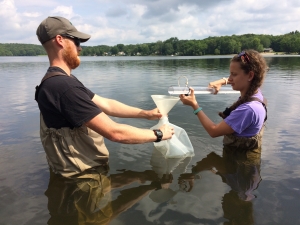 In addition, the conference will feature 40 oral presentations, 5 hands-on workshops, and 15 poster presentations. Topics are varied and will include local water monitoring case studies; DEEP programmatic updates; education and outreach programs; new monitoring technologies; and special symposia on effecting change at the local level, management of aquatic invasives and cyanobacteria monitoring.
In addition, the conference will feature 40 oral presentations, 5 hands-on workshops, and 15 poster presentations. Topics are varied and will include local water monitoring case studies; DEEP programmatic updates; education and outreach programs; new monitoring technologies; and special symposia on effecting change at the local level, management of aquatic invasives and cyanobacteria monitoring.
The cost to attend is $45 ($55 after February 28); continental breakfast and lunch are included in the registration. Attendance is limited; early registration is encouraged. To learn more or to register visit the conference webpage. Questions? Contact Meghan Lally, Conference Chair and DEEP Volunteer Water Monitoring Coordinator at DEEP.VolunteerWaterMonitoring@ct.gov or 860-424-3061.
|
Releasing Helium Balloons and Sky Lanterns is Harmful to Wildlife . . . and Can Be Illegal
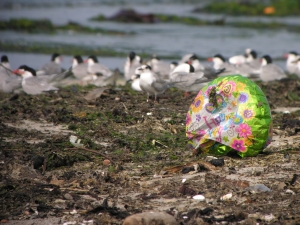 How often have you been to a celebration at a community event, business, or home that includes the release of dozens of colorful helium balloons or maybe the release of sky lanterns? Balloons and sky lanterns are deadly to wildlife when they fall back to the ground as litter and are picked up by birds for their nests or mistaken for food by marine creatures. Sky lanterns also pose a fire hazard.
Balloon releases (10 or more in a 24-hour period) are illegal in Connecticut - however, no balloons should be released at all. According to the Connecticut Fire Prevention Code, the use of unmanned, free-floating sky lanterns and similar devices utilizing an open flame is prohibited.
Instead of releasing these items, find an environmentally friendly way to celebrate an event or memorialize a loved one. Some suggestions include:
- Planting a native tree or shrub.
- Establishing a native flower or butterfly garden.
- Using colorful streamers, flags, or banners instead of balloons (these items are weather resistant and reusable).
- Displaying garden spinners and pinwheels.
- Holding a fundraiser to benefit a local conservation organization or cause.
(Please note that releases of butterflies and domestic birds are not good for the environment.)
|
Pomperaug River Watershed Based Plan Addresses Bacteria Water Quality Issues
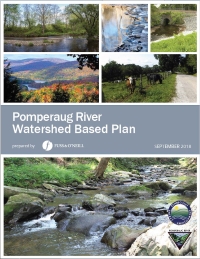
The
Pomperaug River Watershed Coalition (PRWC) has completed a watershed based plan to address water quality impairments related to bacteria impacting the Pomperaug River and its tributaries.
The
Pomperaug River Watershed Based Plan (Plan) can be accessed on PRWC's website as well as the
DEEP Watershed Management Plans web page. The Pomperaug River watershed is located primarily within the towns of Bethlehem, Southbury and Woodbury but also includes portions of Middlebury, Morris, Roxbury, Washington and Watertown. The Pomperaug River is a tributary to the Housatonic River.
PRWC developed the Plan with input from watershed municipalities and other key stakeholders. The Plan identifies sources of bacteria impacting water quality and recommends strategies to address these areas. This
Plan can now be used by PRWC, watershed communities and other stakeholders as a long-term roadmap and fundraising tool to voluntarily reduce and eliminate bacteria sources, so that the Pomperaug River and its tributaries will meet Connecticut Water Quality Standards.
|
|
The Connecticut Conference on Natural Resources
The 13th Annual Connecticut Conference on Natural Resources (CCNR) is a multidisciplinary conference bringing together individuals working with natural resource and environmental management in Connecticut to share research, information, and ideas. It is scheduled for March 18, 2019
(snow date is March 19, 2019) at UCONN, Storrs Campus.
Registration is now open. The conference is for all those working with the environment and natural resources through state and federal government, academia, non- governmental organizations, and the engaged public whom might belong to and volunteer with non-governmental organizations, place-based conservation organizations, and local government committees.
|
|
| Wildlife Encounters - A Few Reminders on What to Do
Spring in Connecticut comes with a variety of issues related to wildlife. Following are some tips to avoid conflicts between people and wild animals.
"Orphaned" Wildlife: Young animals may appear to be "orphaned" but the adult is probably close by, waiting for you to leave. It is best to leave the animal alone. If you are absolutely certain a wild animal has been injured or orphaned, before touching or moving it contact DEEP's Wildlife Division at 860-424-3011, or contact a
DEEP authorized wildlife rehabilitator. To protect fragile young wildlife, people are urged to keep cats indoors and dogs on leashes. Countless numbers of rabbits, squirrels, birds and other wildlife fall prey to pets every year.
Rabies Awareness: To prevent exposure to
rabid animals, vaccinate pets against rabies and never approach any animal, domestic or wild, that is acting disoriented or is unusually tame or aggressive. Suspected rabid animals should be reported to the local police or animal control officer. If local authorities cannot be reached, contact DEEP at 860-424-3333.
|
|
Urban Forest Inventory and Analysis
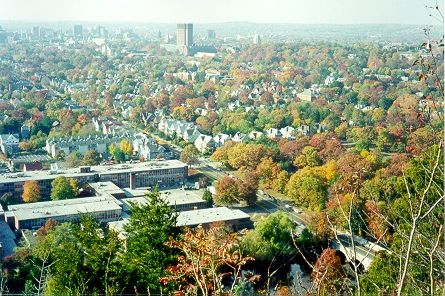 The
Urban Forest Inventory and Analysis (UFIA) program is a long-term assessment of trees in urban areas being conducted by the USDA Forest Service. This program was initiated in Connecticut in summer 2018. All work in establishing the UFIA plots and collecting the data will be done under the supervision of the
Northern Research Station of the USDA Forest Service. The Forest Service is working closely with the DEEP Division of Forestry. Once implemented, the UFIA program will, over time, provide reliable information regarding the composition and condition of the urban forest, trends relating to urban tree health and other tree concerns, useful information on the potential use of wood from urban trees, details on the benefits provided by these trees, and more. This program is long term. The first set of data for Connecticut will not be completed until 2024; however, preliminary results may be released before then.
|
|
Need to contact DEEP?
Find the most up-to-date phone numbers for our program areas, a list of who to contact to report environmental concerns or problems, an A to Z subject directory, and other information about our agency on our Contact Us webpage.
|
The Connecticut Department of Energy and Environmental Protection is an Affirmative Action and Equal Opportunity Employer that is committed to complying with the Americans with Disabilities Act. To request an accommodation contact us at (860) 418-5910 or
deep.accommodations@ct.gov
|
|
| |
|